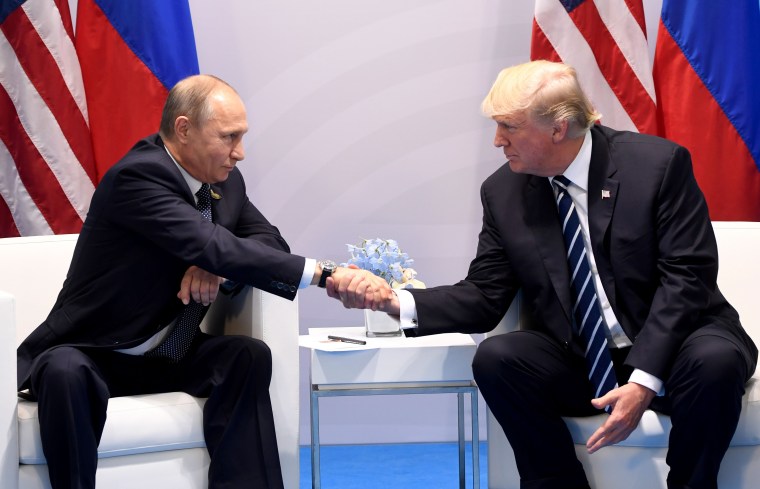We're pretty accustomed to Donald Trump throwing occasional Twitter tantrums, but his avalanche of nonsense over the weekend was startling, even for him. You've heard the phrase, "Never let 'em see you sweat"? Following Friday's indictments against the president's Russian benefactors, Trump ignored the adage in rather profound ways.
But of particular interest was a curious denial. "I never said Russia did not meddle in the election," he tweeted. "I said 'it may be Russia, or China or another country or group, or it may be a 400 pound genius sitting in bed and playing with his computer.'"
At face value, the president is trying to suggest he sliced the truth thin: he didn't explicitly say Russia was innocent, the argument goes, so much as he raised the possibility that Russia may not be guilty. As such, Trump -- who likes to pretend he's incapable of saying something that's incorrect -- wasn't technically wrong.
That's a nice try, I suppose, but reality is stubborn.
Mr. Trump is referring to comments he made during the first presidential debate on Sept. 26, 2016. But as The New York Times reported in a fact-check in June, Mr. Trump has also explicitly disagreed with the assessment of various intelligence agencies or cast doubt on Russia's role in the vote.
The Times' article documents eight examples of Trump telling the public that he did not believe Russia intervened in the 2016 election, including the unambiguous assertion, "I don't believe they interfered."
The list isn't intended to be comprehensive, and it omitted plenty of related examples, many of which CNBC flagged. One of my personal favorites came during the presidential transition period, when the Republican, confronted with a U.S. intelligence assessment that Russia intervened on Trump's behalf, called the findings "ridiculous," adding, "I don't believe it."
It was one of several instances in which Trump rejected the findings of U.S. intelligence professionals, whom he's routinely mocked and publicly criticized for daring to, we now know, tell the truth about a foreign adversary's intelligence operation.
A Washington Post report added, "According to The Fact Checker's database of Trump claims, Trump in his first year as president ... 44 more times denounced the Russian probe as a hoax or witch hunt perpetuated by Democrats."
And in each of those instances, Trump was ridiculously wrong.
Of course, this has never been about simply pointing and laughing at the confused amateur president. Rather, the more important observation was far broader: Donald Trump had to choose between believing U.S. intelligence agencies or trusting Vladimir Putin's word. Or more to the point, the president had to decide what information to take to the American people: the findings of his own country's intelligence professionals, or the line Moscow wanted him to say.
Trump chose the latter -- and now he's trying to pretend he didn't. I'd love to hear a benign explanation about why.
